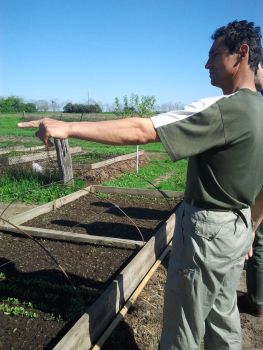By Claudia Ciobanu
WARSAW, June 11, 2012 (TerraViva) European farming is based on the Common Agricultural Policy (CAP) of the EU, whose main logic, to produce increasingly more food largely through industrial farming, needs reassessment.
The costs have been steep: agriculture accounts for one-quarter of water use in Europe; yearly, 100,000 hectares of land are lost because of deterioration; biodiversity is vanishing at an unstoppable pace.
Now a process of reforming the CAP is taking place, to result in a revamped policy after 2014.

Marcel Has, from Firiteaz village, in Arad county, Western Romania. In his eco-farmi he grows mostly vegetables, which he sells to a community supported agriculture scheme. Credit: Claudia Ciobanu/IPS
Over 350 billion euros of public money go to financing of EU farms over seven years. The commission proposed that, starting from 2014, 30 percent of direct payments to farmers are conditioned upon the adoption of measures like crop diversification, maintaining pasture lands permanently, and leaving seven percent of the land on each farm uncultivated.
For many of the bloc’s over 15 million farmers, the proposals may not be that difficult to implement. In Eastern European countries like Romania, for example, up to two-thirds of farms can be subsistence or semi-subsistence.
“Most of the people have given up farming in our village,” says Marcel Has, a Romanian farmer who works on a two-hectare farm (most of it rented) in Firiteaz village, Arad county, Western Romania.
“I was also about to give up two years ago, but then I read in a farmers’ magazine about the possibility of connecting directly with consumers who are interested in the type of clean, local food I can provide. Now I can support my family and fix my house. I think there is a future in ecological farming, food in the supermarkets is of poor quality and people want to eat better.”
Opponents argue that it implies huge new bureaucratic burdens on farmers and that it could stifle existing green practices.
“I know that some farmers are already doing more; we definitely do not want to penalise the champions,” EU Commissioner for Agriculture Dacian Ciolos told TerraViva. “That’s why the Commission is ready to consider a system of equivalency in those member states or regions which have already done a lot in this direction.”
“But beyond this flexibility, the principle stays the same,” he added. “The key point with these (green) agricultural practices linked to direct payments is to have a real impact at European level. And we can only have it if we ask every single farmer in the EU to employ these practices.”
Green NGOs are finding themselves as allies of the European executive in convincing member states to accept the reforms.
It “is an attempt to shift thinking about CAP, to orient it towards the safeguarding of public goods,” Trees Robijns from BirdLife, one of the NGOs working on CAP in Brussels, told TerraViva. “But we will see whether it turns out to be a greening of CAP or rather greenwashing.”







 Add to Google
Add to Google







